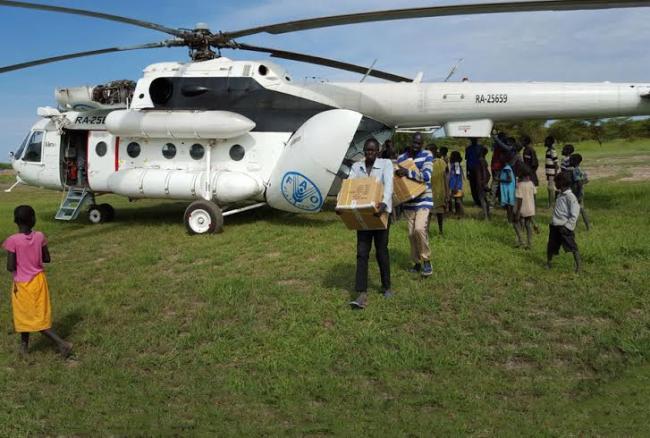06 Oct 2015, 07:28 am Print

The recent deliveries of livelihood kits add to the 430,000 crop, vegetable and fishing kits FAO already distributed earlier this year to support an estimated 2.3 million people facing severe food insecurity and soaring malnutrition.
“In many parts of South Sudan the rainy season is hampering access by road and regular fixed-wing flights, so FAO has been using the only means possible to reach these communities – helicopters,” said Abdoul Karim Bah, FAO’s Emergency Response Manager for South Sudan, in a press release.
“This means we can also more easily take advantage of small windows of opportunity to distribute aid—so as the ceasefire continues to hold, we‘ve been able to move quickly to reach areas that haven’t been reached since the start of the conflict,” he added.
At the end of August, the country’s President, Salva Kiir, signed a peace agreement with the former Vice-President Riek Machar, ending the 20 month-long conflict. The security situation in South Sudan had been deteriorated steadily since political in-fighting between them and their respective factions erupted in December 2013.
As of 1 October, FAO says it has delivered more than 70,000 livelihood kits through the operation. Each kit weighs no more than 2 kilograms and contains seven varieties of vegetable seeds and fishing materials to increase people's food intake and combat high rates of malnutrition by diversifying diets.
At the same time, FAO announced it is carrying out control missions to prevent outbreaks of livestock diseases, administering drugs and vaccines to high-risk areas.
Meanwhile, access problems and concerns for staff security have reportedly been severely limiting aid reaching remote and isolated communities in conflict-affected areas in recent months, which called for alternative ways to deliver aid quickly and safely.
“With this operation, our presence on the ground is limited to a maximum of 30 minutes, which is just enough time to handover the inputs to our partners,” said Serge Tissot, FAO’s Representative in South Sudan.
With more than two million people having been uprooted from their homes due to conflict, FAO further underlined that it is committed to enabling farmers, fisherfolk and herders to plant crops, fish waterways and protect livestock from fatal diseases in the areas where they have found shelter.
Photo: FAO
- World must ‘speed up’ efforts to end AIDS pandemic by 2030
- World Bank provides $700 million to improve primary education in Bangladesh
- Aid has not reached ‘a single soul’ in Syria’s besieged areas in December, says UN advisor
- UN tribunal for former Yugoslavia leaves behind culture of accountability, says Guterres
- Security Council renews Syrian cross-border relief convoys amid ongoing challenges for aid workers





-1763561110.jpg)
